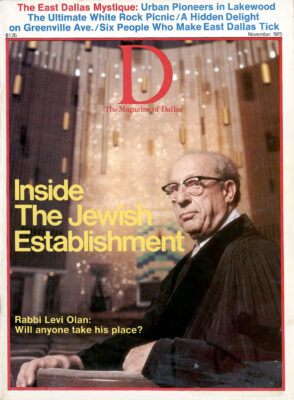“I was restless. Call it an 11-year itch,” says Braniff president Ed Acker of his surprise resignation from the executive post at the airline last month.
Acker, 46, resigned the Braniff post to take the helm of New York-based Transway International Corporation, a widely diversified conglomerate involved in shipping, trucking and steel. Transway has a 50-year-old reputation for financial conservatism which is reflected in its strong bottom line. Apparently, the Transway board was looking for a leader to marshal its considerable cash resources for bigger and better diversification projects.
Although Acker’s resignation was followed by some speculation on the street that he was dissatisfied with board chairman Harding Lawrence, Acker is quick to deny any hints of a power struggle. “Harding and I have been as close as brothers. We divided executive responsibilities; my area included the things I love most – operations and finance. When it came to policy decisions, we saw eye to eye. If anything, I’ve been too happy here.”
Acker had spent 11 years building Braniff from an anemic, struggling regional airline into a healthy, international passenger and freight carrier. In the mid-Sixties, Acker – then with Troy Post at Great America Corporation – had convinced Post to acquire controlling interest in Braniff as a solid investment. Through a combination of stock purchases from TI magnates Cecil Green and Eugene McDermott, and a public tendering, they managed to obtain 56 per cent of the airline. It wasn’t long before Acker found himself deeply involved in financial planning for Braniff. “I soon discovered that the airline desperately needed new management. Not only was I too young to run a major company, I didn’t know a damn thing about airplanes.” In a series of meetings with Continental Airlines executives, Acker became acquainted with a vice president there by the name of Harding Lawrence. Lawrence had the experience, the knowledge, and the ambition to shape Braniff into a strong company.
Lawrence took over the presidency at the airline, with Acker coming aboard as executive vice president for finance (while still holding down his job at Great America). By 1970, Lawrence had moved to the chairman’s slot, and Acker to the presidency.
The glory days at Braniff had to end sometime. “We worked twelve-hour days for five years while we were growing. As things began to stabilize here, I found myself with the time to play some golf. That’s when the itch started,” Acker says. Federal regulation of airline company acquisitions, coupled with the stability of operations at Braniff, made Acker’s potential field of financial play rather small. There were fewer major problems to wrestle with and even fewer opportunities to construct the complex corporate acquisitions he loves.
The job change will force Acker to commute between Dallas and New York, something that doesn’t bother him at all. “To me, jumping on a plane two or three times a week is just as easy as the other guy’s getting in his car and driving to work.” He will remain on Braniff’s board and continue to serve on its executive committee with Lawrence, Post, Robert Stewart, and Herman Lay.
Related Articles

Hot Properties
Hot Property: An Architectural Gem You’ve Probably Driven By But Didn’t Know Was There
It's hidden in plain sight.
By Jessica Otte

Local News
Wherein We Ask: WTF Is Going on With DCAD’s Property Valuations?
Property tax valuations have increased by hundreds of thousands for some Dallas homeowners, providing quite a shock. What's up with that?

Commercial Real Estate
Former Mayor Tom Leppert: Let’s Get Back on Track, Dallas
The city has an opportunity to lead the charge in becoming a more connected and efficient America, writes the former public official and construction company CEO.
By Tom Leppert


